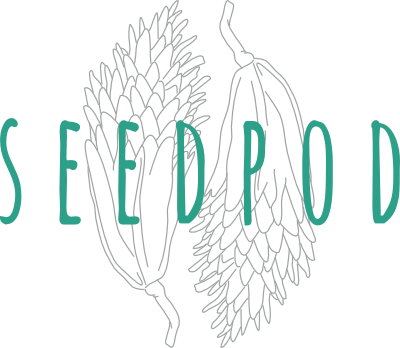1. Gocco Print
I’ve decided to do a few prints based on my drawings. Here’s the beginnings of the first one. I’ve watercolored a background wash on each piece of paper, then printed on top of it. I’m a printmaker!! It makes me giddy to design and print and print and print.
Like my high-tech registration jig there? I’ve got a pretty fancy set-up with a box of plastic bags and some “pins” the same size as hole puncher holes so that each piece of paper will be in exactly the right place.
2. The Doll House
This is it. The present Santa brought for Brenna. His elves put the main shell together, then left a note saying they thought she’d like to do the painting of house, windows and railings and putting together of the bazillion little pieces. She really treasures that authentic letter from Santa, and we’ve been at the painting for almost 2 months now.
Good news is that I spent ALL day Saturday on it and it’s much further along now than in these pictures. Stay tuned for the grand unveiling…
3. The Discussion/ Book Group
Barry says I need to come up with a name for it– which is a good idea, I’m just having a hard time thinking of something to fit that’s not super silly…
Anyway, this past Thursday we met again and talked about A Thomas Jefferson Education by Oliver DeMille and Core and Love of Learning: A Recipe for Success by Oliver and his wife Rachel DeMille. For a brief intro to the ideas behind Thomas Jefferson Education you can read these articles.
I really focused the bulk of the discussion on the Recipe. It starts with a great discussion of child development and the “two views of childhood.” The first is that children learn like adults, the second is that children learn differently than adults. The views of John Dewey and Lev Vygotsky are discussed as proponents of the first view, and the basis of our modern public school system. Erik Erikson and Jean Piaget, and both of their theories of child development, are annalyzed in light of the second view.
The fruits of Dewey and Vygotsky (whether they’d like it or not) are conveyor-belt factory-schools with their classification, bells and whistles to create a standardized product, marketable to the “work place.” The problem is, that kids really don’t learn like adults. Instead of learning the intended lessons from teachers of ABCs and 123s, kids learn the lessons of the factory environment–conformity, the disjointedness of things (history is separate from science and has nothing to do with language arts), competition, stratification… Anyway, I could go on, but that’s not really what I wanted to write about.
The real beauty is in the research and findings of Erikson and Piaget. New neuroscience research even echos their findings. Kids grow and develop! They change as they grow. Now, this is widely accepted, even by teachers and administrators of public schools, but is totally contradicted by forcing little kids to sit in desks and regurgitate facts fed to them by teachers when, developmentally, they best learn through play. The thing that makes me really excited about what Piaget and Erikson say about teaching little children is that, until about 8 years of age a foundation needs to be laid of trust, individual identity, right and wrong, truth and falsehood. Children are natural learners– everything is new and exciting to them. The worst thing we can do is pen their active bodies and imaginations up in classrooms and desks, stand in front of them with charts and methods, and try to convince them that reading or numbers or toads or seeds are interesting and worth learning about. What happens there is precisely the opposite. Often kids are convinced out of their love of learning and natural curiosity because its hard or boring. I really believe that the academic learning that we think kids need comes from the real developmentally appropriate cirriculum for little children: love, exploration, play, nature, and lots of time sitting on a parents’ lap reading books.
Now, the fact that these guys say it’s not until the age of 8 (give or take), that kids are really developmentally capable of self-reflection, reasoning, and really learning through and excercise of their own will, is really significant to me religiously. I love finding more truth to really clarify what I already believe to be true. 8 is the age of accountability in Mormon doctrine– so focusing on laying a foundation of identity, good and bad, right and wrong, true and false is precisely what I need to do. Piaget and Erikson just articulate foundational principles that have always existed. They’re true.
And to lay that foundation we need to develop a family culture that nurtures a love of learning, but that’s a whole other entry…

hi – very interesting about the age of accountability in your religion. Are you homeschooling your kids?
It’s nice checking in on your blog. You will always be The Person Who First Showed Me How To Spin 😉
Seedpod Books and Art » Blog Archive » the social thing